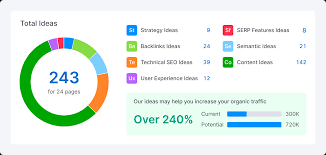
Search Engine Optimization (SEO) is a critical component of any successful digital marketing strategy. While off-page SEO tactics like link building and social media marketing are important, on-page SEO plays a crucial role in improving your website’s visibility and search engine rankings.
On-page SEO refers to the optimization of individual web pages to improve their search engine rankings and attract more organic traffic. By focusing on on-page elements such as content, meta tags, headings, and internal linking, you can make your website more relevant to search engines and users alike.
One of the key elements of on-page SEO is keyword optimization. By strategically placing relevant keywords throughout your content, meta tags, and headings, you can signal to search engines what your page is about and improve its chances of ranking for those keywords.
Another important aspect of on-page SEO is optimizing meta tags, including title tags and meta descriptions. These elements provide search engines with information about your page’s content and help improve click-through rates from search engine results pages.
Internal linking is also crucial for on-page SEO. By linking to other relevant pages within your website, you can help search engines understand the structure of your site and improve the user experience by guiding visitors to related content.
Effective on-page SEO can have a significant impact on your website’s visibility in search engine results. By optimizing individual pages for specific keywords and providing high-quality, relevant content, you can attract more organic traffic and increase your chances of ranking higher in search results.
Additionally, on-page SEO can help improve the user experience by making it easier for visitors to find the information they are looking for. By organizing content logically, using clear headings, and providing internal links to related pages, you can keep users engaged and encourage them to explore more of your website.
On-page SEO is a fundamental aspect of any successful digital marketing strategy. By optimizing individual web pages for relevant keywords, improving meta tags, and implementing internal linking strategies, you can boost your website’s visibility in search engine results and attract more organic traffic.
If you want to improve your website’s search engine rankings and drive more targeted traffic to your site, investing time and resources into on-page SEO is essential. By focusing on these key elements, you can create a strong foundation for long-term success in the competitive online landscape.
On-page SEO refers to the practice of optimizing individual web pages to improve their search engine rankings and attract more organic traffic. This involves strategically incorporating relevant keywords into the content, meta tags, and headings of a page to signal its relevance to search engines. Additionally, on-page SEO includes optimizing meta tags like title tags and meta descriptions, as well as implementing internal linking strategies to enhance the overall structure and user experience of a website. By focusing on these key elements, on-page SEO plays a crucial role in boosting a website’s visibility in search engine results and driving targeted traffic to the site.
On-page SEO is crucial for several reasons. Firstly, it helps search engines understand the content and relevance of your web pages, which can lead to higher rankings in search results. By optimizing on-page elements such as keywords, meta tags, and internal links, you make it easier for search engines to crawl and index your site effectively. Additionally, on-page SEO enhances the user experience by ensuring that your content is well-organized, informative, and easy to navigate. This can lead to increased engagement, lower bounce rates, and ultimately more conversions. Overall, investing in on-page SEO is essential for improving your website’s visibility, attracting organic traffic, and staying competitive in the digital landscape.
Optimizing meta tags is a crucial aspect of on-page SEO that can significantly impact your website’s visibility in search engine results. To optimize meta tags effectively, start by ensuring that your title tag accurately reflects the content of the page and includes relevant keywords. Keep the title tag concise, ideally under 60 characters, to ensure it displays properly in search engine results pages. Additionally, craft compelling meta descriptions that provide a concise summary of the page’s content and encourage users to click through. Including relevant keywords in the meta description can also help improve your page’s relevance to search queries. Finally, don’t overlook the importance of optimizing other meta tags like meta keywords and meta robots directives to further enhance your on-page SEO efforts.
When it comes to keyword optimization in on-page SEO, there are several best practices to keep in mind. Firstly, it’s essential to conduct thorough keyword research to identify relevant and high-traffic keywords for your content. Once you’ve selected your target keywords, strategically place them in key areas such as the title tag, meta description, headings, and throughout the content while maintaining natural readability. Avoid keyword stuffing and focus on creating high-quality, informative content that provides value to your audience. Regularly monitor and adjust your keyword strategy based on performance data and search engine algorithm updates to ensure continued effectiveness in optimizing your web pages for search engines.
Internal linking plays a crucial role in on-page SEO by helping search engines understand the structure and hierarchy of a website’s content. By strategically linking to other relevant pages within the site, internal linking establishes connections between different pieces of content, signaling their importance and relationship to each other. This not only enhances the user experience by guiding visitors to related information but also distributes link equity throughout the site, boosting the authority of individual pages and improving their chances of ranking higher in search engine results. Effective internal linking can increase crawlability and indexation of pages, ultimately contributing to improved visibility and organic traffic for the website.